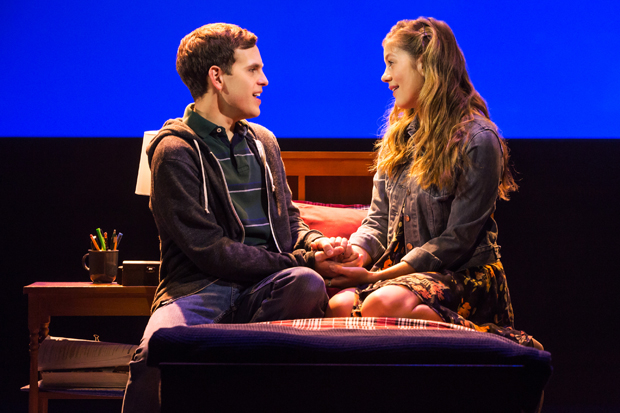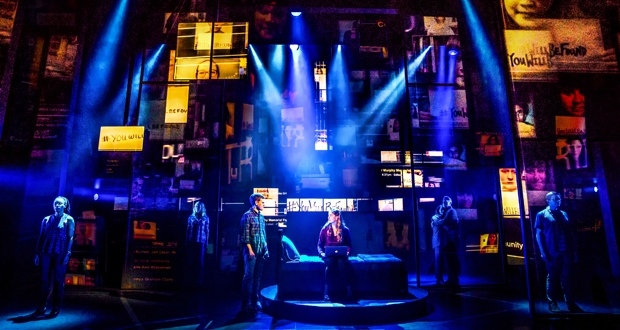All the Lonely People and Dear Evan Hansen

(© Matthew Murphy)
If you doubt the sharpness of the Tony Award-winning musical Dear Evan Hansen, a trip to the lounge of Broadway's Music Box Theatre during intermission will allay your qualms. There you will find a room jam-packed with intelligent theatergoers glued to their screens. Rather than speaking to one another, they tap, tap, tap on the glass, waving through a window to somebody (or some bot) far away. This isn't the result of a developmental disorder. It's just how people behave in 2018, and it explains a lot about the onstage events we've just witnessed.
It may also explain the disarmingly unadorned quality of Taylor Trensch's performance. He has recently assumed the title role, and while the rest of the original cast remains, it is amazing just how profoundly the show changes with a different Evan Hansen.
Evan is an awkward and lonely teenager whose therapist has tasked him with writing motivational letters to himself. When school outcast Connor Murphy (Mike Faist) steals Evan's letter right before killing himself, it looks like a suicide note addressed to Evan. Connor's parents, Larry (Michael Park) and Cynthia (Jennifer Laura Thompson), find the note in his backpack and look to Evan for answers. Rather than tell them the truth, Evan concocts an elaborate secret friendship with Connor. Evan's "family friend" Jared (Will Roland) helps him write and backdate the emails proving it. They reveal Connor to be a sensitive, misunderstood soul who could only share his stealthy kindness with Evan.

(© Matthew Murphy)
Why would Evan do this? Is he trying to offer solace to a mourning family, or is he trying to get closer to Connor's sister, Zoe (Laura Dreyfuss), a longtime crush? Either way, things spiral out of control when school overachiever Alana (Kristolyn Lloyd) joins Evan in forming the Connor Project, a suicide prevention organization that eventually receives worldwide attention.
Composers Benj Pasek and Justin Paul convey this story through a radio-ready pop score garnished with a touch of Nashville. Pasek and Paul have such a mastery of the dark art of popular music, with its chill-inducing key changes and tear-jerking chord progressions, that even if we're intellectually aware of this emotional manipulation, we cannot help but succumb to it. This becomes shockingly clear during the anthemic first act finale, "You Will Be Found," in which Evan's eulogy of Connor goes viral. We know it is all based on a lie, but the goosebumps arrive nonetheless.
That conflict between feelings and facts is at the heart of Steven Levenson's book, which is one of the smartest ever on Broadway. Using a contemporary setting, Levenson depicts the timeless practice of remembering the dead as better than they truly were, substituting the ugly truth for beautiful fiction. The difference today is that our white lies have the potential to be refracted through the prism of social media, beaming out rainbow-colored BS for the ravenous world's consumption.

(© Matthew Murphy)
Director Michael Greif handsomely stages our collective delusion on David Korins's sleek set. Judicious lighting by Japhy Weideman allows us to see both the performers and the ever-updating screens around them. Projection designer Peter Nigrini visualizes the Internet, with Evan's fraudulent emails regularly hovering behind him as he ingratiates himself with the Murphys. Nigrini collaborates with sound designer Nevin Steinberg to conjure a breathtaking online storm of emotion, as strangers come together to ritually grieve, comfort, and more terrifyingly, destroy.
Finely crafted performances reinforce the show's themes. A melancholy fry in her voice, Dreyfuss plays Zoe like a true survivor. She never met the gentle Connor that Evan describes, and she is rightly skeptical. Not so for Thompson's Cynthia: As Evan spins his yarn, she clutches her hand to her mouth like she’s just seen the Virgin Mary in her organic Chardonnay. After a year on Broadway, all of the performances from the original cast have become deeper and clearer.
This is especially true of Rachel Bay Jones, who plays Evan's mom with heartbreaking grace. A nurse's aid who can offer her son neither the time nor the resources that she would like, she still pushes forward with a catch of sadness in her voice. She clings to an optimism she doesn't really feel, because what other choice does she have?

(© Matthew Murphy)
As Evan, Trensch rises to the daunting task of stepping into the role that won Ben Platt a Tony Award. Platt's twitchy, sweaty performance led some critics to speculate that Evan is somewhere on the autism spectrum. By contrast, Trensch delivers a restrained interpretation that is not as easy to diagnose. We don't know why he's seeing a therapist or what drugs he's on, but we can see with every forced smile that he is deeply unhappy. Similarly, as he fights for his high notes, Trensch's slighter, somewhat strained voice tells the story of a young man struggling to be heard. His actions cannot be chalked up to a disorder, but the very normal desire for happiness, security, and recognition. In a time when "mental illness" has become a blanket explanation for destructive behavior, giving Evan Hansen nothing to hide behind actually feels like the braver choice.
Even if you've seen Dear Evan Hansen before, you've never quite seen it like this. By giving a less flashy performance, Trensch allows the themes of this uncommonly challenging musical to shine through. You may not cry as hard, but you won't be able to stop thinking about it.










